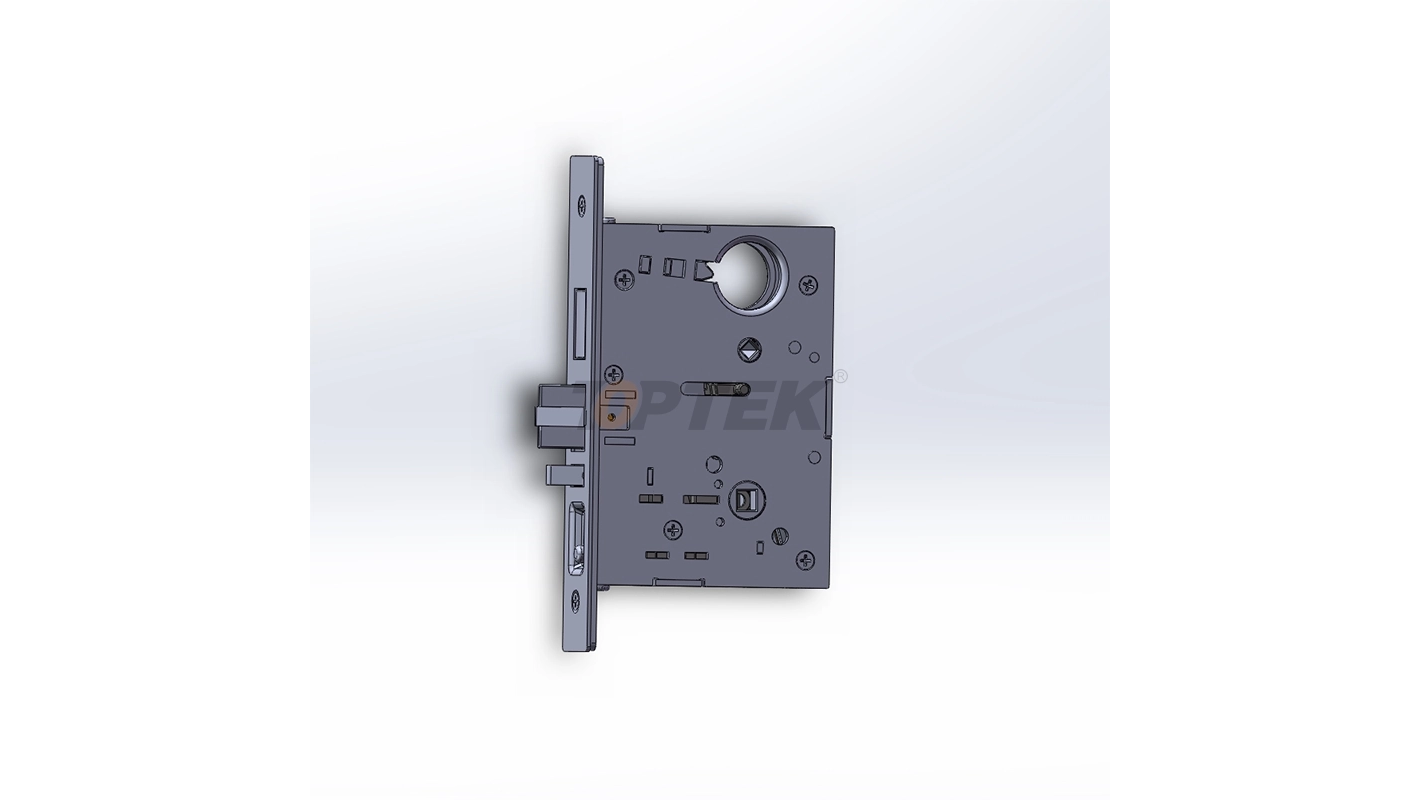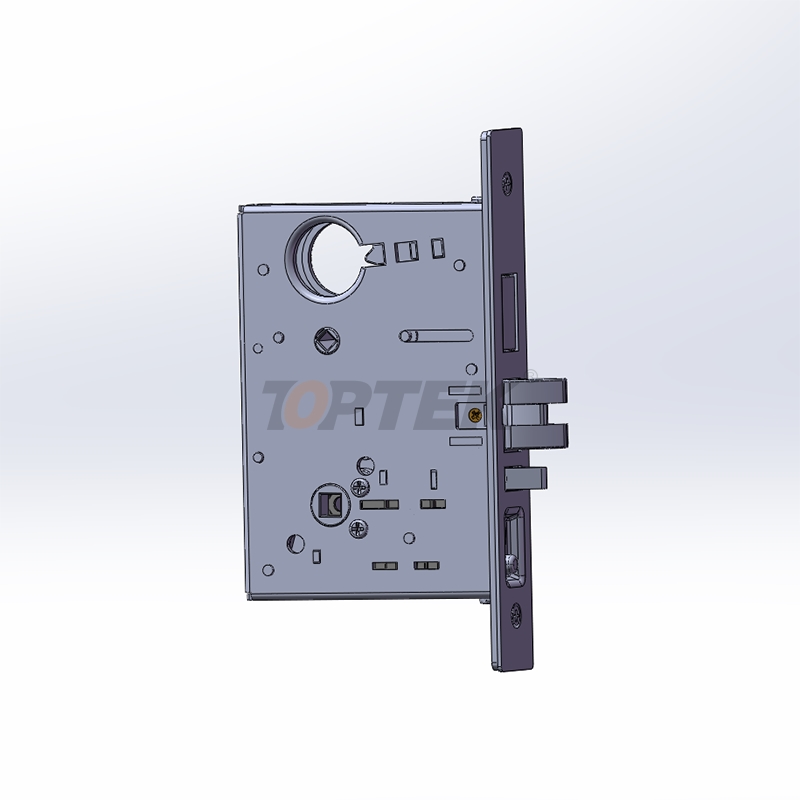Choosing the right door locks for your business is more complex than selecting residential hardware. Commercial properties face unique security challenges, from managing employee access to protecting valuable assets during off-hours. The wrong lock system can leave your business vulnerable to break-ins, create compliance issues, or frustrate daily operations.
Commercial door locks come in various types, each designed for specific security needs and usage patterns. Understanding these options helps you make informed decisions that protect your investment while maintaining smooth business operations. This guide explores the most common commercial lock types, their applications, and key certification standards that ensure quality and reliability.
Mechanical Commercial Door Locks
Mechanical locks remain the foundation of commercial security systems. These locks operate without electricity, making them reliable in power outages and simple to maintain.
Deadbolts
Commercial deadbolts provide superior security compared to standard door knobs. Grade 1 deadbolts meet the highest security standards and can withstand significant force. Single-cylinder deadbolts use a key on the exterior and thumb turn inside, while double-cylinder versions require keys on both sides for maximum security.
These locks work well for exterior doors, storage areas, and offices containing sensitive materials. Many ANSI/BHMA certified commercial locks in the deadbolt category offer enhanced durability and security features specifically designed for high-traffic business environments.
Mortise Locks
Mortise locks fit into a pocket cut into the door edge, providing exceptional strength and security. The lock body sits completely within the door, making it nearly impossible to remove without proper tools and access.
Commercial mortise locks typically include multiple locking points and can accommodate various handle styles. They're ideal for main entrances, executive offices, and areas requiring both security and aesthetic appeal. The robust construction makes them suitable for heavy-use applications where other lock types might fail.
Cylindrical Locks
Also known as bored locks, cylindrical locks install through holes drilled in the door. They're easier to install than mortise locks and less expensive, making them popular for interior applications.
These locks work well for private offices, conference rooms, and storage areas with moderate security needs. While not as strong as mortise locks, quality cylindrical locks still provide adequate protection for many commercial applications.
Electronic and Smart Lock Systems
Modern businesses increasingly rely on electronic access control for enhanced security and convenience. These systems offer features impossible with mechanical locks alone.
Keypad Entry Systems
Keypad locks eliminate the need for physical keys by using numeric codes for access. Users enter a predetermined combination to unlock the door, making them ideal for shared spaces or areas with frequent personnel changes.
These systems allow easy code changes without rekeying hardware. Many models store multiple user codes and provide audit trails showing who accessed the door and when. European certified commercial locks often include advanced keypad systems with enhanced weather resistance and longer battery life.
Card Reader Systems
Proximity card readers use RFID technology to grant access when authorized cards come near the reader. Users simply wave their card near the device to unlock the door, providing quick and convenient access.
Card systems offer excellent access control management. Administrators can easily add or remove users, set time restrictions, and track entry attempts. Lost cards can be deactivated instantly without changing the entire system.
Biometric Locks
Fingerprint and other biometric locks provide the highest level of access control by using unique physical characteristics for identification. These systems prevent unauthorized key duplication or sharing since access requires the actual person to be present.
Biometric locks work exceptionally well for high-security areas like server rooms, laboratories, or executive suites. While more expensive than other options, they provide unmatched security and detailed access logging.

Specialized Commercial Lock Applications
Certain business environments require specialized locking solutions designed for specific challenges or regulations.
Panic Hardware
Also called crash bars or push bars, panic hardware allows quick egress during emergencies while maintaining security from the outside. Fire codes often require these devices on certain doors in commercial buildings.
Rim exit devices mount on the door surface, while concealed vertical rod systems hide the hardware within the door frame. Both types must meet strict safety standards and allow doors to open with minimal pressure during emergencies.
Magnetic Locks
Electromagnetic locks use powerful magnets to secure doors and require electrical power to maintain their locked state. They provide excellent security and work well with access control systems.
These locks fail-safe, automatically unlocking during power outages or fire alarm activation. They're popular for glass doors where traditional hardware would be unsightly or compromise the door's integrity.
High-Security Cylinders
Some commercial applications require cylinders with enhanced pick resistance and key control. These specialized locks use unique keyways and advanced internal mechanisms to prevent unauthorized access.
High-security cylinders often include features like drill resistance, bump-proof designs, and restricted key duplication. They're essential for banks, government facilities, and businesses handling sensitive information or valuable assets.
Understanding Lock Certifications
Commercial lock certifications help ensure you're purchasing reliable, tested hardware that meets industry standards.
ANSI/BHMA Standards
The American National Standards Institute (ANSI) and Builders Hardware Manufacturers Association (BHMA) establish performance standards for door hardware. ANSI/BHMA certified commercial locks undergo rigorous testing for durability, security, and functionality.
Grade 1 locks meet the highest standards for heavy-duty commercial use, while Grade 2 locks suit moderate commercial applications. Grade 3 locks are typically reserved for light commercial or residential use.
European Certifications
European certified commercial locks follow different standards but offer comparable quality assurance. These certifications often focus on specific performance criteria like weather resistance, corrosion protection, and mechanical strength.
European standards may be particularly relevant for businesses with international operations or those seeking hardware that meets global specifications.


Choosing the Right Commercial Lock System
Selecting appropriate commercial door locks requires careful consideration of your specific needs, budget, and security requirements.
Start by assessing your security needs. High-traffic areas need durable hardware that can withstand constant use, while sensitive areas may require advanced access control features. Consider who needs access to each area and how often that access might change.
Budget plays a significant role in lock selection, but remember that quality hardware is an investment in your business's security. Cheaper locks may save money initially but could cost more in replacements, repairs, and security breaches over time.
Think about integration with existing systems. If you already have an access control system, new locks should work with your current infrastructure. Future expansion plans should also influence your choice to ensure compatibility as your business grows.
Securing Your Business Investment
Commercial door locks are critical components of your overall security strategy. The right combination of mechanical reliability and modern technology creates a comprehensive access control system that protects your business while supporting daily operations.
Quality locks from reputable manufacturers, whether ANSI/BHMA certified commercial locks or European certified commercial locks, provide the durability and security features your business needs. Consider consulting with a commercial locksmith or security professional to evaluate your specific requirements and ensure your chosen systems meet all relevant codes and standards.
Investing in appropriate commercial door hardware today protects your business assets, employees, and reputation for years to come.
Commercial Door Locks
ANSI/BHMA certified commercial lock
European certified commercial lock
English
العربية
Français
Русский
Español
Português
Deutsch
italiano
日本語
한국어
Nederlands
Tiếng Việt
ไทย
Polski
Türkçe
አማርኛ
ພາສາລາວ
ភាសាខ្មែរ
Bahasa Melayu
ဗမာစာ
தமிழ்
Filipino
Bahasa Indonesia
magyar
Română
Čeština
Монгол
қазақ
Српски
हिन्दी
فارسی
Kiswahili
Slovenčina
Slovenščina
Norsk
Svenska
українська
Ελληνικά
Suomi
Հայերեն
עברית
Latine
Dansk
اردو
Shqip
বাংলা
Hrvatski
Afrikaans
Gaeilge
Eesti keel
Māori
සිංහල
नेपाली
Oʻzbekcha
latviešu
অসমীয়া
Aymara
Azərbaycan dili
Bamanankan
Euskara
Беларуская мова
भोजपुरी
Bosanski
Български
Català
Cebuano
Corsu
ދިވެހި
डोग्रिड ने दी
Esperanto
Eʋegbe
Frysk
Galego
ქართული
guarani
ગુજરાતી
Kreyòl ayisyen
Hausa
ʻŌlelo Hawaiʻi
Hmoob
íslenska
Igbo
Ilocano
Basa Jawa
ಕನ್ನಡ
Kinyarwanda
गोंगेन हें नांव
Krio we dɛn kɔl Krio
Kurdî
Kurdî
Кыргызча
Lingala
Lietuvių
Oluganda
Lëtzebuergesch
Македонски
मैथिली
Malagasy
മലയാളം
Malti
मराठी
ꯃꯦꯇꯥꯏ (ꯃꯅꯤꯄꯨꯔꯤ) ꯴.
Mizo tawng
Chichewa
ଓଡ଼ିଆ
Afaan Oromoo
پښتو
ਪੰਜਾਬੀ
Runasimi
Gagana Samoa
संस्कृत
Gaelo Albannach
Sepeti
Sesotho
chiShona
سنڌي
Soomaali
Basa Sunda
Wikang Tagalog
Тоҷикӣ
Татарча
తెలుగు
ትግንያውያን
Xitsonga
Türkmençe
संस्कृत
ئۇيغۇرچە
Cymraeg
isiXhosa
ייִדיש
Yorùbá
isiZulu








































